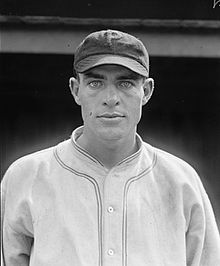Inductees
Glenn “Buckshot” Wright

February 6, 1901—April 6, 1984
Wright was born in Archie, Missouri, a tiny town not far from Kansas City. His father operated a hardware store and he helped out by running errands and servicing customers. Wright played no high school ball since there was no team, but he did play sandlot ball on an area club that scheduled games with teams from other places like Kansas City. He pitched and played shortstop. While attending the University of Missouri from 1919-1921 he continued to play with his local club. After a game with a team from Kansas City, a member of the other squad told someone in the Kansas City Blues organization about Wright. He then received an offer from John Savage, general manager for the Blues, and signed a contract in 1921 for $200, “a tremendous salary for a farm boy. I wasn’t ready for Double-A ball, however, so Kansas City sent me to Independence, Kansas, of the Southwestern League for the 1921 season. I hit .316 and we won the pennant.”
He had a good season in 1923 with Kansas City before he was purchased by the Pittsburgh Pirates for $40,000. The Yankees offered $100,000 for him after seeing him perform in the Junior World Series, but since Pittsburgh already had an option to buy, they got him. But Wright would not sign with Pittsburgh for 1924 unless he got a portion of the purchase price. After negotiating, he was given a $7,500 bonus, which was interpreted as part of the purchase price.
When he reported for training in 1924, Manager Bill McKechnie told him the shortstop job was his and it remained his through the 1928 season when he was traded to Brooklyn for pitcher Jess Petty. During his time with Pittsburgh, Wright performed the feat he is perhaps most famous for. On May 7, 1925, Wright recorded an unassisted triple play against the Cardinals, tagging out Jimmy Cooney and future Hall of Famers Jim Bottomley and Rogers Hornsby.
Wright was a good fielder as well as a good hitter and was considered by many of his peers the best shortstop in the National League. He had excellent range and a very strong arm. However, he was not very accurate. When he was in Kansas City in 1922 and 1923 before his sale to the Pittsburgh Pirates, he acquired the nickname “Buckshot” because he could “throw hard, but no one could tell where.” He set a major league record for shortstop assists in his first year with the Pittsburgh Pirates in 1924, 601, a record which remained unbroken until 1980 when Ozzie Smith bested it.
As a hitter, Wright had four .300 seasons, his best being .321 with Brooklyn in 1930. He drove in over 100 runs on four different occasions and was Pittsburgh’s all-time home run leader for many years. He also held the NL mark for most home runs by a shortstop-22 in 1930- until Alvin Dark hit 23 in 1953.
After his retirement, Wright lived with his wife of many years in Fresno, California where occasionally did some scouting, and frequently attended the Fresno Giants games.
When The Sporting News began selecting its annual All-Star Team in 1925, Wright filled the shortstop berth. The other members of this first major league team were Jim Bottomley Rogers Hornsby, Pie Traynor, outfielders Kiki Cuyler, Max Carey, and Goose Goslin, catcher Mickey Cochrane, and pitchers Walter Johnson, Ed Rommel, and Dazzy Vance. Wright is the only survivor of that great aggregation.